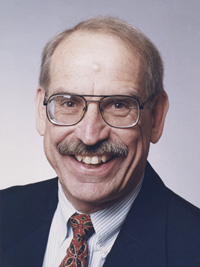 Professor John E. Bercaw was born in Cincinnati, Ohio on December 3, 1944. He received his BS degree from North Carolina State University in 1967, his PhD from the University of Michigan in 1971 under the direction of Hans Brintzinger, and undertook postdoctoral research with Jack Halpern at the University of Chicago for one year. He joined the faculty of the California Institute of Technology as an Arthur Amos Noyes Research Fellow in 1972, and in 1974 he joined the professorial ranks, becoming Professor of Chemistry in 1979. From 1985 to 1990 he was the Shell Distinguished Professor of Chemistry, and in 1993 he was named Centennial Professor of Chemistry. Bercaw has been a Visiting Miller Professor at University of California, Berkeley (1990), the Robert Burns Woodward Visiting Professor at Harvard University (1999), and in 1989-90 a Royal Society of Chemistry Guest Research Fellow at Oxford University. His research interests are in synthetic, structural and mechanistic organotransition metal chemistry. Recent studies include metallocene catalysts for Ziegler-Natta polymerization of olefins and investigations of hydrocarbon hydroxylation with transition metal complexes.
Professor John E. Bercaw was born in Cincinnati, Ohio on December 3, 1944. He received his BS degree from North Carolina State University in 1967, his PhD from the University of Michigan in 1971 under the direction of Hans Brintzinger, and undertook postdoctoral research with Jack Halpern at the University of Chicago for one year. He joined the faculty of the California Institute of Technology as an Arthur Amos Noyes Research Fellow in 1972, and in 1974 he joined the professorial ranks, becoming Professor of Chemistry in 1979. From 1985 to 1990 he was the Shell Distinguished Professor of Chemistry, and in 1993 he was named Centennial Professor of Chemistry. Bercaw has been a Visiting Miller Professor at University of California, Berkeley (1990), the Robert Burns Woodward Visiting Professor at Harvard University (1999), and in 1989-90 a Royal Society of Chemistry Guest Research Fellow at Oxford University. His research interests are in synthetic, structural and mechanistic organotransition metal chemistry. Recent studies include metallocene catalysts for Ziegler-Natta polymerization of olefins and investigations of hydrocarbon hydroxylation with transition metal complexes.
Bercaw consulted with Exxon for more than twenty years before beginning with BP in 2002. He has received the American Chemical Society awards in Pure Chemistry (1980), for Organometallic Chemistry (1990), for Distinguished Service in the Advancement of Inorganic Chemistry (1997), the George A. Olah Award for Hydrocarbon or Petroleum Chemistry (1999), and an Arthur C. Cope Scholar Award (2000). He has also been selected a Chemical Pioneer by the American Institute of Chemists (1999). He was selected as a Fellow of the American Association for the Advancement of Science (1986) and was elected a member of the National Academy of Sciences (1990), as a Fellow of the American Academy of Arts and Sciences (1991), and an Honorary Doctorate of Science, University of Chicago (2001).